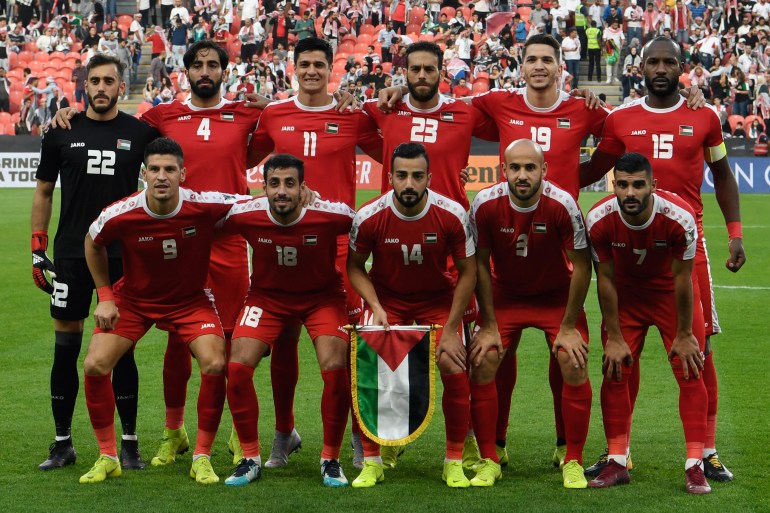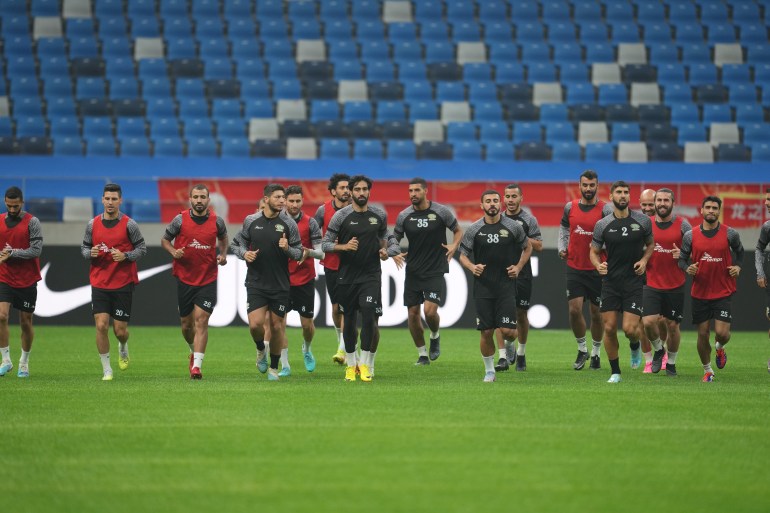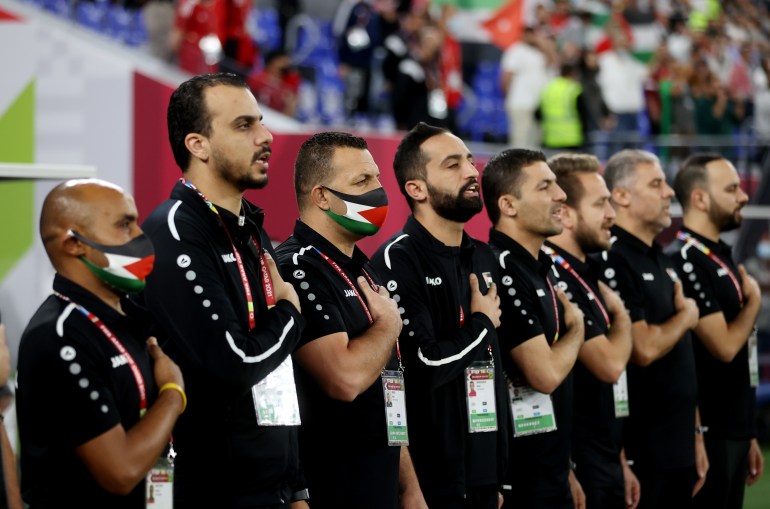“It’s not a good situation for playing or for living, because of what is happening to our people in Gaza,” says Hamadi, the goalkeeper of the Palestine national football team. “Our mind is with our people in Palestine because we see every day what’s happening.”
On Sunday, Palestine begins its 2024 Asian Cup campaign in Qatar against Iran. But preparations for the 23-man squad have been overshadowed by the war in Gaza.
Three weeks after Hamas’s October 7 attack on Israel, which led to the deaths of hundreds of Israeli civilians and the subsequent bombardment of Gaza which has so far killed more than 23,000 people there, mostly children and women, the Palestine team left the West Bank overland for Jordan ahead of two 2026 World Cup qualifiers against Lebanon and Australia.
The first World Cup match was due to take place in Beirut on November 16 but was moved to Sharjah in the United Arab Emirates. The second match five days later against Australia, which was supposed to take place in the West Bank, was moved to Kuwait City.
Now in Qatar for the Asian Cup, the players have been unable to return to the West Bank since. They can’t be sure they would be allowed out again due to the tightening of Israeli forces’ movement restrictions on Palestinians.
Since then, the squad has stayed together as the conflict has worsened, touching every player, coach and official. “Everyone is glued to the news, before and after training, be it on the bus or at the hotel,” Palestine’s Tunisian coach, Makram Daboub, told AFP during a recent training camp in Saudi Arabia, shortly before arriving in Qatar. The players, Daboub said, “have a constant feeling of anxiety for their families”.
On January 2, almost two months after leaving the West Bank, the Palestine team finally arrived in Doha.
With movement in and out of the Gaza Strip impossible, only two players from Gaza are in the squad. Defender Mohammed Saleh and striker Mahmoud Wadi were both only able to join the squad because they play for clubs in Egypt.
Back in 2018, Wadi had been trapped in Gaza after being initially refused permission by Israeli authorities to travel back to the club he was then playing for in the West Bank. He eventually signed with Pyramids FC in Egypt for a record $1.1m, making him Palestine’s most expensive player.
Both men, according to Hamadi, now nervously await news of their families every day. “Saleh sent a message to his family 10 days ago,” says Hamadi. “Only yesterday they answered him. They’re OK.”
Then, a few days ago, word reached the squad that Hani al-Masdar, a popular former player, coach and general manager of Palestine’s Olympic team, had been killed after his village was bombed. “Saleh, Wadi, the younger players from the Olympic national team knew him very well. They were playing together before the war.” says Hamadi. “Nobody should be in this situation. Nobody in the world.”

Travel bans
Palestinian football has long reflected the political realities on the ground. The history of the game in the region goes back to the 1920s. But the Palestinian Football Association was not officially recognised by FIFA, global football’s governing body, until 1998. One of Sepp Blatter’s first acts after becoming FIFA president that same year was to fly to Rafah where he was greeted by adoring crowds.
FIFA remains one of the highest profile arenas in which an entity called Palestine is recognised internationally. And it has, largely, been a success story.
In 2011, Palestine played its first home men’s World Cup qualifier at the Faisal Al-Husseini International Stadium in Al-Ram, outside Ramallah. A women’s national team was set up, as was a professional football league in the West Bank.
But the Israel-Palestine conflict is never far away. For years, players from Gaza have been prevented from travelling outside the Strip for international matches.
“Before the war in Gaza, the rule was to deny everybody [permission to] move in and out. And the denial was the rule,” says Susan Shalabi, vice president of the Palestinian Football Association (PFA).
“Now there is nothing. You cannot move a cat out of Gaza,” she said.
‘Where is FIFA now?’
Stricter movement restrictions and checkpoints mean the West Bank league has been suspended after only a few games, while both the Palestinian Olympic and Football Association headquarters in Gaza have been destroyed.
Dozens of Palestinian players, coaches and officials have been killed in the Israeli bombardment of Gaza. To date, Shalabi says, at least 71 players have been killed, adding that she believes this is likely to be an underestimate.
In previous wars in Gaza, football infrastructure, especially stadiums, has been targeted by Israel. In 2011 and 2014, Israel claimed football pitches were being used by Palestinian armed groups to launch rockets and were therefore legitimate targets.
But strikes on football stadiums have drawn heavy criticism from the international community, especially from FIFA and the Asian Football Confederation (AFC). When images emerged last month of a heavily damaged Yarmouk Stadium in Gaza City being used to house hundreds of Palestinian prisoners, many of whom appeared to be children, the PFA wrote to FIFA and the AFC demanding a response. But so far neither have commented.
“They [FIFA and the AFC] are not doing anything at all,” says Shalabi, who is also a member of the AFC’s executive committee. “These organisations are supposed at the very least to condemn what’s happening now – and let me call it genocide, because what’s happening now in Gaza is genocide. They are afraid. But there hasn’t been any real action to send a clear message that these things should not happen.”

A ‘double standard’
By contrast, Shalabi says, FIFA responded swiftly to Russia’s 2022 invasion of Ukraine by barring Russian football teams.
“How many days did it take the IOC [International Olympic Committee] and FIFA to take action? It happened in less than four days if I’m correct,” she says. “All Russian teams were suspended. Even the youth ones, even the Paralympic teams – and they were suspended for the actions of Russia against civilians. And there wasn’t even anything documented about football. Now all the football infrastructure in Gaza has been destroyed. Nobody’s taking action. It’s a double standard.”
Rami Hamadi, the Palestine goalkeeper, is not sure what he will return to. He was born in the Israeli city of Shefa-Amr and made history by becoming the first active player in the Israeli Premier League to play for the Palestinian national team.
“I am a ’48 Arab’,” Hamadi says, referring to those Palestinians who stayed within Israel’s borders after its creation in 1948. Today, he plays for Jabal Al-Mukaber, a team from East Jerusalem and the current champions of the West Bank Premier League.
He does not know when the league will restart, or even if it will be allowed to resume.

Expressing ‘identification with the enemy’
Hamadi and others like him with Israeli citizenship face another challenge as well. In September 2023, midfielder Ataa Jaber, a former Israel under-21 captain who had become the first Arab to captain an Israeli national team, announced he was switching to play for the Palestinian national team.
But amid the atmosphere of suspicion that followed October 7, Israel’s culture and sports minister, Miki Zohar, demanded Jaber’s citizenship be revoked after he stood for a minute’s silence before the Palestine v Lebanon World Cup qualification match in November.
“During the game, Jaber expressed identification with the enemy when he stood for a minute of silence in memory of ‘the victims in Gaza’ while ignoring the murdered on the Israeli side and identifying with the Nazi terrorist organisation Hamas,” Zohar wrote in a letter to Israel’s interior minister. So far no action has been taken. Jaber is also in Palestine’s Asian Cup squad.
Meanwhile, Hamadi has been inundated with messages from Palestinians around the world. “‘You have to do very well for our people. You have to get the message to all the world, to send the message to the world. Send our pain to all the world.’ I have messages like that every day,” he says. “And not just me, all the players. Children send me messages; ‘Please make me happy’. I will give one million per cent, not one hundred per cent, to make that child happy.”
‘We will rise up from the ashes’
As it heads towards the Asian Cup finals, Palestine has a strong team despite all its setbacks. This will be their third appearance at this particular tournament.
After playing Iran, one of Asia’s strongest teams, Palestine will play the UAE before a final group game against rank outsiders Hong Kong.
Their main hope, says Hamadi, is to win their first game at the finals and take it step by step from there. Despite everything, there is hope within the team that Palestine could be the “surprise package” of the tournament, with strong home support for every game.
“Look what happened in the World Cup with Morocco,” he says. “No one imagined that Morocco would reach the semifinals like that.”
Shalabi, too, believes Palestine has a chance to go all the way, as Iraq did in 2007 when the team won the tournament even as their homeland burned. “There is a good chance for the team to accomplish something in the Asian Cup,” she says. “We will rise up from the ashes.”
For Hamadi and the rest of the team, there will always be a bigger story, a bigger cause and a bigger motivation.
“I want to play so everyone knows what’s happening in my country, so everyone will know who we are. We are people. We are human. The same as you. 23,000 people are dead. People think it’s just numbers. No. Every number was a life. Every number had a dream. Every number had a story, memories, you know? That’s why we are here, to send the message for all the world,” he says. “And to play football.”
